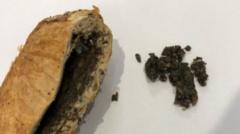After a lengthy presentation of testimonies, Erin Patterson's fate now rests with the jury, who will decide on charges of murder and attempted murder related to a toxic meal served to her relatives.
**Mushroom Murder Trial: Jury Begins Deliberation in Australian Case**

**Mushroom Murder Trial: Jury Begins Deliberation in Australian Case**
The trial of a woman accused of poisoning her family with deadly mushrooms reaches a critical juncture as the jury weighs the evidence.
The jury in the contentious murder trial of Erin Patterson, 50, has officially retired to deliberate her fate in a case that has garnered significant public attention. Patterson is facing three counts of murder and one count of attempted murder following a tragic incident in July 2023, where she allegedly prepared a homemade beef Wellington meal containing toxic death cap mushrooms for her family in Leongatha, Victoria.
Despite pleading not guilty to all charges, the prosecution argues that Patterson deliberately included the toxic fungi, subsequently deceiving authorities about the origin of the mushrooms and disposing of evidence, such as a food dehydrator linked to the preparation of the meal. Three of her relatives, Don and Gail Patterson, aged 70, and Heather Wilkinson, 66, died shortly after consuming the dish, while Heather's husband, Ian Wilkinson, who also partook in the meal, suffered severe health complications.
As the trial drew to a close, Justice Christopher Beale instructed the 14-member jury on the complexities of the case, summarizing critical components from nearly two months of hearings involving over 50 witnesses. Prosecutor Nanette Rogers SC stated in her closing remarks that Patterson's numerous lies indicated a awareness of her culpability. She suggested that Patterson fabricated a cancer diagnosis to lure her family into accepting the meal, implying that this act was part of a deliberate plan to harm.
The defense, however, maintained that Patterson had no motive to harm her in-laws and contended that the toxic mushrooms could have been mistakenly added to the dish from her pantry. Patterson testified that she was close with her family members and had no intention of causing them harm, claiming the mushrooms were not purposefully selected for their toxicity. They argued that Patterson's lies stemmed from panic rather than guilt.
In closing, the defense attorney, Colin Mandy SC, emphasized that their client was not on trial for deceit but rather for alleged murder, challenging the prosecution to provide conclusive evidence linking Patterson to a deliberate crime. Justice Beale reminded jurors that their role is to assess the facts impartially and that emotional responses should not influence their judgment.
The jury has been sequestered to ensure their focus during deliberations, with strict measures preventing outside contact until a verdict is reached. The legal community and the public await the jury's decision on the future of Erin Patterson.
Despite pleading not guilty to all charges, the prosecution argues that Patterson deliberately included the toxic fungi, subsequently deceiving authorities about the origin of the mushrooms and disposing of evidence, such as a food dehydrator linked to the preparation of the meal. Three of her relatives, Don and Gail Patterson, aged 70, and Heather Wilkinson, 66, died shortly after consuming the dish, while Heather's husband, Ian Wilkinson, who also partook in the meal, suffered severe health complications.
As the trial drew to a close, Justice Christopher Beale instructed the 14-member jury on the complexities of the case, summarizing critical components from nearly two months of hearings involving over 50 witnesses. Prosecutor Nanette Rogers SC stated in her closing remarks that Patterson's numerous lies indicated a awareness of her culpability. She suggested that Patterson fabricated a cancer diagnosis to lure her family into accepting the meal, implying that this act was part of a deliberate plan to harm.
The defense, however, maintained that Patterson had no motive to harm her in-laws and contended that the toxic mushrooms could have been mistakenly added to the dish from her pantry. Patterson testified that she was close with her family members and had no intention of causing them harm, claiming the mushrooms were not purposefully selected for their toxicity. They argued that Patterson's lies stemmed from panic rather than guilt.
In closing, the defense attorney, Colin Mandy SC, emphasized that their client was not on trial for deceit but rather for alleged murder, challenging the prosecution to provide conclusive evidence linking Patterson to a deliberate crime. Justice Beale reminded jurors that their role is to assess the facts impartially and that emotional responses should not influence their judgment.
The jury has been sequestered to ensure their focus during deliberations, with strict measures preventing outside contact until a verdict is reached. The legal community and the public await the jury's decision on the future of Erin Patterson.




















